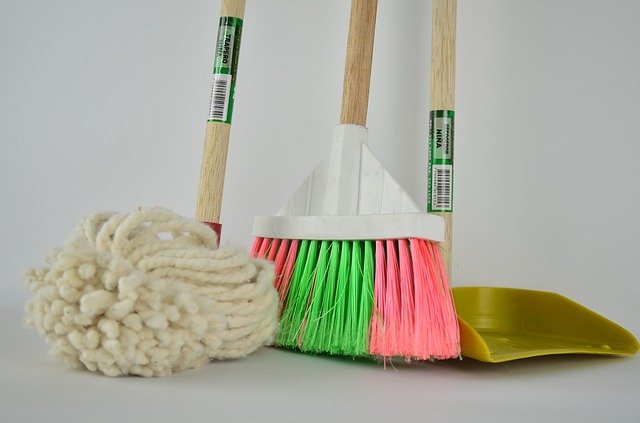The Pesach Cleaning Rush: Halachic and Moral Dimensions of Hiring a Cleaning Lady
הרב שי טחןכד אדר ב, תשפד03/04/2024Snatching the Cleaning Lady: Ethical and Halachic Considerations Before Pesach
תגיות:ניקיוןפסחהעסקה
צילום: freepik
Before Pesach, every household gets very busy cleaning and kashering their house. Since it's a significant job and people today are extremely busy with their daily chores, work, and many other tasks, we tend to use the extra help of cleaning services such as cleaning ladies. However, using a cleaning lady comes with many halachic concerns that must be discussed.
Questions arise such as: Can we rely on their cleaning and kashering? Can we leave them alone in the house with our kitchen, where so many things can go wrong and render our kitchen non-kosher?? Can the husband or our boys stay alone with her, or is it considered yichud? Additionally, there are monetary-related concerns that must be discussed.
non-kosher?? Can the husband or our boys stay alone with her, or is it considered yichud? Additionally, there are monetary-related concerns that must be discussed.
Snatching the Cleaning Lady: Ethical and Halachic Considerations Before Pesach.
Today, we will start with the monetary concerns, and BH in future articles, we will address the other issues. A common concern that many households face as Pesach approaches is the dilemma with our cleaning lady, whom we use throughout the year, and when we need her the most—before Pesach—she disappears or keeps calling in sick, claiming her son is ill. We know clearly that it's just an excuse, as many others are offering her more money to come and clean their houses.
A few questions come to mind. Firstly, can we also reach out to other cleaning ladies and offer them more money to "grab" them before Pesach?
This question is based on a Gemara(קידושין נט, א) named 'Pauper Engaging with a Loaf of Bread.' The Gemara deals with a pauper who is engaging in the acquisition of a loaf of bread that he found, and another person comes and takes it from him. The Gemara says that it's forbidden to take it away before the pauper has a chance to take it, and if he does, he is considered wicked. From here, the Gemara says that if someone is looking to buy a certain house, no one is allowed to go before him and buy it. Tosafot(ד״ה עני) also learns that if a student has a certain rabbi teaching him, it's not permitted for another rabbi to overreach and offer his services to that student.
Tosafot also teaches that not in every scenario is there a prohibition to engage with such cases. It is only not permitted where the "merchandise" is something that can be purchased or found elsewhere. In such cases, we would say to him, "Go and bother to find it elsewhere." However, in a situation where it is a unique deal that isn't found elsewhere, he is permitted to buy it.
An example would be if someone is looking to pick up a lost item (such that doesn't have an obligation to return to its owner), and before they pick it up, one is permitted to grab it, saying it's not something they can find elsewhere. Therefore, Tosafot says that if, for example, a student (or his father) is interested in a certain rabbi because of his teaching skills but he is already employed elsewhere, they may reach out to him with a better offer and take him. It's permitted because they can argue that it's not possible to find someone with such skills, and it's similar to our case above of finding an item.
This is the opinion of Tosafot and the Rema(חו״מ סימן רלז) which the Ashkenazim follow as their ruling. However, the Shulchan Aruch presents another opinion (Rashi) that there is no difference, and any form of snatching is not permitted, whether one can find such services elsewhere or not(י״א וי״א הלכה כי״א בתרא) .
Applying this to the case of the cleaning lady, according to Ashkenazim, if she possesses unique skills or qualities that are not easily found elsewhere, such as specialized cleaning techniques, specific knowledge of your household's needs, or exceptional reliability, it might be permissible to offer her a higher wage to secure her services before Pesach. Also, if it's challenging to find other cleaning ladies, it would be permitted to offer her better pay and continue to use her services.
Still, we should keep in mind that even if it is permitted according to halachic terms, it's extremely not moral and fair to do so and should be avoided. This practice causes others much aggravation and pain, and it also leads cleaning services to unfairly raise their fees, which is a form of price gouging when the demand is bigger than the supply.(שו״ת מנחת יצחק ח״ה סימן עז) . However, if cleaning services could be found elsewhere, it would be obligated to find another cleaning lady as explained by the laws of the 'Pauper Engaging with a Loaf of Bread.'
This was the opinion followed by the Ashkenazim, but Sephardim who follow the Shulchan Aruch may not take the cleaning lady in any case, whether they can find other help or she is the only one available.
While it's wrong and forbidden to "snatch" someone else's cleaning lady, the cleaning lady also shares fault if she had been hired by one place throughout the year when they could have found a different worker, and now when it's harder she leaves. According to halacha(ערוה״ש סימן שלג סעיף יח) , it is permitted to hold their salary if it wasn't paid yet in order to ensure they don't disappear when most needed. However, this halacha is strictly bound by city law. If it is illegal to withhold salary in such a scenario according to local laws, it should not be done.
The same idea applies to doing business with someone regularly. When two people or two companies have been dealing with each other for a while, it is considered as if the buyer ‘belongs to the seller’ as long as they deal exclusively with each other, and one may not try to take the buyer from the seller(דין מערופיא, מובא ברמ״א חו״מ סימן קנו ס״ה) .
However, if the buyer decides to leave and buy from elsewhere, then there is no problem dealing with him(סמ״ע סימן שפו סק״י) . Similarly, in the event that the cleaning lady offers her services independently to another person without them trying to poach her, or if she left her previous work place, then it is permitted to use her services.
Dealing with agencies.
Another question on this topic is when people use agencies to match them with a cleaning lady. The agency gets a cut of the profit from this match. After a while, the cleaning lady builds a relationship with her employers, and they may discuss continuing their service without the agency, which would save the employer a few dollars for every hour she works. Is this permitted? The answer is that it's not permitted.
The poskim explained that there is an obligation to pay the shadchan (matchmaker) their cut for the service. This isn't any different from any other business transaction, such as buying real estate, which obligates the seller to pay the agent their share, or even buying merchandise from a store where the buyer pays more than what the merchant pays and sells for more.
In conclusion, it is important to remember that while we are obligated to clean our houses for Pesach, using a cleaning service can certainly make this task easier. However, we should not allow this mitzvah obligation to lead us to violate other prohibitions. We must heed the wisdom of our sages, who cautioned against performing a mitzvah that arises from a sin, as this is not acceptable in the eyes of Hashem. Therefore, as we prepare our homes for Pesach, let us do so with mindfulness, ensuring that our actions align with the spirit of the holiday and the values of our tradition.
Questions arise such as: Can we rely on their cleaning and kashering? Can we leave them alone in the house with our kitchen, where so many things can go wrong and render our kitchen

צילום: freepik
Snatching the Cleaning Lady: Ethical and Halachic Considerations Before Pesach.
Today, we will start with the monetary concerns, and BH in future articles, we will address the other issues. A common concern that many households face as Pesach approaches is the dilemma with our cleaning lady, whom we use throughout the year, and when we need her the most—before Pesach—she disappears or keeps calling in sick, claiming her son is ill. We know clearly that it's just an excuse, as many others are offering her more money to come and clean their houses.
A few questions come to mind. Firstly, can we also reach out to other cleaning ladies and offer them more money to "grab" them before Pesach?
This question is based on a Gemara(קידושין נט, א) named 'Pauper Engaging with a Loaf of Bread.' The Gemara deals with a pauper who is engaging in the acquisition of a loaf of bread that he found, and another person comes and takes it from him. The Gemara says that it's forbidden to take it away before the pauper has a chance to take it, and if he does, he is considered wicked. From here, the Gemara says that if someone is looking to buy a certain house, no one is allowed to go before him and buy it. Tosafot(ד״ה עני) also learns that if a student has a certain rabbi teaching him, it's not permitted for another rabbi to overreach and offer his services to that student.
Tosafot also teaches that not in every scenario is there a prohibition to engage with such cases. It is only not permitted where the "merchandise" is something that can be purchased or found elsewhere. In such cases, we would say to him, "Go and bother to find it elsewhere." However, in a situation where it is a unique deal that isn't found elsewhere, he is permitted to buy it.
An example would be if someone is looking to pick up a lost item (such that doesn't have an obligation to return to its owner), and before they pick it up, one is permitted to grab it, saying it's not something they can find elsewhere. Therefore, Tosafot says that if, for example, a student (or his father) is interested in a certain rabbi because of his teaching skills but he is already employed elsewhere, they may reach out to him with a better offer and take him. It's permitted because they can argue that it's not possible to find someone with such skills, and it's similar to our case above of finding an item.
This is the opinion of Tosafot and the Rema(חו״מ סימן רלז) which the Ashkenazim follow as their ruling. However, the Shulchan Aruch presents another opinion (Rashi) that there is no difference, and any form of snatching is not permitted, whether one can find such services elsewhere or not(י״א וי״א הלכה כי״א בתרא) .
Applying this to the case of the cleaning lady, according to Ashkenazim, if she possesses unique skills or qualities that are not easily found elsewhere, such as specialized cleaning techniques, specific knowledge of your household's needs, or exceptional reliability, it might be permissible to offer her a higher wage to secure her services before Pesach. Also, if it's challenging to find other cleaning ladies, it would be permitted to offer her better pay and continue to use her services.
Still, we should keep in mind that even if it is permitted according to halachic terms, it's extremely not moral and fair to do so and should be avoided. This practice causes others much aggravation and pain, and it also leads cleaning services to unfairly raise their fees, which is a form of price gouging when the demand is bigger than the supply.(שו״ת מנחת יצחק ח״ה סימן עז) . However, if cleaning services could be found elsewhere, it would be obligated to find another cleaning lady as explained by the laws of the 'Pauper Engaging with a Loaf of Bread.'
This was the opinion followed by the Ashkenazim, but Sephardim who follow the Shulchan Aruch may not take the cleaning lady in any case, whether they can find other help or she is the only one available.
While it's wrong and forbidden to "snatch" someone else's cleaning lady, the cleaning lady also shares fault if she had been hired by one place throughout the year when they could have found a different worker, and now when it's harder she leaves. According to halacha(ערוה״ש סימן שלג סעיף יח) , it is permitted to hold their salary if it wasn't paid yet in order to ensure they don't disappear when most needed. However, this halacha is strictly bound by city law. If it is illegal to withhold salary in such a scenario according to local laws, it should not be done.
The same idea applies to doing business with someone regularly. When two people or two companies have been dealing with each other for a while, it is considered as if the buyer ‘belongs to the seller’ as long as they deal exclusively with each other, and one may not try to take the buyer from the seller(דין מערופיא, מובא ברמ״א חו״מ סימן קנו ס״ה) .
However, if the buyer decides to leave and buy from elsewhere, then there is no problem dealing with him(סמ״ע סימן שפו סק״י) . Similarly, in the event that the cleaning lady offers her services independently to another person without them trying to poach her, or if she left her previous work place, then it is permitted to use her services.
Dealing with agencies.
Another question on this topic is when people use agencies to match them with a cleaning lady. The agency gets a cut of the profit from this match. After a while, the cleaning lady builds a relationship with her employers, and they may discuss continuing their service without the agency, which would save the employer a few dollars for every hour she works. Is this permitted? The answer is that it's not permitted.
The poskim explained that there is an obligation to pay the shadchan (matchmaker) their cut for the service. This isn't any different from any other business transaction, such as buying real estate, which obligates the seller to pay the agent their share, or even buying merchandise from a store where the buyer pays more than what the merchant pays and sells for more.
In conclusion, it is important to remember that while we are obligated to clean our houses for Pesach, using a cleaning service can certainly make this task easier. However, we should not allow this mitzvah obligation to lead us to violate other prohibitions. We must heed the wisdom of our sages, who cautioned against performing a mitzvah that arises from a sin, as this is not acceptable in the eyes of Hashem. Therefore, as we prepare our homes for Pesach, let us do so with mindfulness, ensuring that our actions align with the spirit of the holiday and the values of our tradition.
הוסף תגובה
עוד מהרב שי טחן
עוד בנושא הלכה








